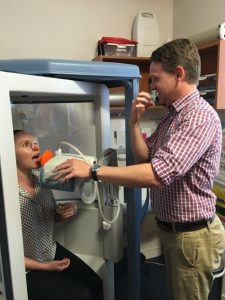
Lung Function Testing Preparation
A lung function test is a series of breathing tests where you will be required to breathe in different patterns through a mouthpiece. These patterns may require you to breath fast, take big breaths in, empty your lungs out and hold your breath. The respiratory scientist conducting the test will talk you through each process. A lung function test is a simple, non-invasive way to examine the lungs and your breathing.
WHY AM I HAVING THIS TEST?
 There are many different reasons your doctor may send you to get a lung function test. Some of these reasons include:
There are many different reasons your doctor may send you to get a lung function test. Some of these reasons include:
- To diagnose the cause of a cough or shortness of breath
- To evaluate the severity of disease
- As a general check-up for lung health especially if you have had exposure to cigarette smoke or other hazardous chemicals
- To track disease progression
WHAT DO I BRING TO MY TEST?
If you take any inhalers bring these along with you to your test. Wear comfortable clothes that will not restrict your breathing
HOW LONG WILL THE TEST TAKE?
The lung function test generally takes about half an hour. The exact length of the test will vary for each individual.
COULD I FEEL UNWELL DURING THE TEST?
During the testing you may feel a little bit breathless. The tests can also make you cough and lightheaded for a few seconds. This is normal and you will be given time to recover between tests. There are no side effects from testing and you will be fine to drive home afterwards.
PATIENT INSTRUCTIONS
All patients are asked to refrain from the following before all tests:
- Smoking (1 hour)
- Consuming alcohol or caffeinated drinks (4 hours)
- Performing vigorous exercise (1 hour)
- Eating a large meal (2 hours)
- Wearing restrictive clothing
SPECIFIC TEST INSTRUCTIONS
For these tests Spirometry before and after bronchodilator, Six minute walk test and/or FeNO please note the following:
4 hours before – do not take relievers such as Ventolin, Bricanyl, Atrovent, Asmol or Airomir
12 hours before – do not take long acting relievers such as Foradil, Oxis or Serevent
SKIN ALLERGEN TESTING
72 hours prior to this test avoid taking any form of antihistamines (e.g. Zyrtec, Telfast or Claratyne).
NASAL RESISTANCE TESTING
4 hours prior to this test avoid using any nasal vasoconstrictors.
If you have taken any medications or performed any activities which you think might influence (either positively or negatively) the results of any of these tests inform the respiratory staff prior to the test commencing.
MANNITOL CHALLENGE TEST
The Mannitol challange test require some small preparation for the results to be interpreted accurately.
You have been asked by your doctor to perform a Mannitol Challenge test. During the test you will inhale some Mannitol – which is a sugary powder. Between doses you will perform spirometry (a simple breathing test) to assess how your lungs respond to the Mannitol. It is important that you do not take certain medications prior to your test – please refer to the following table. If you feel you need to take your medications do not hesitate to take them, and call your doctor to reschedule your test appointment.
THINGS NOT TO TAKE
| Day of test | Caffeine (coffee, energy drinks, cola or chocolate), do not smoke or perform vigorous exercise. |
| 8 Hours before test | Ventolin, Bricanyl, Atrovent, Asmol, Airomir, Intal, Tilade |
| 12 Hours before test | Pulmicort, Flixotide Atrovent, QVar, Becloforte, Becotide |
| 48 Hours before test | Seretide, Symbicort, Serevent, Oxis, Nuelin |
| 72 Hours before test | Spiriva, Zyrtec, Telfast, Claratyne |
| 4 Days before | Singulair |



